ITC571 Project Proposal: Semantic Web Mining for E-Commerce Ranking
VerifiedAdded on 2024/06/28
|5
|1216
|226
Project
AI Summary
This project proposal focuses on enhancing E-Commerce website ranking through semantic web mining optimisation. It addresses the limitations of current ranking methods, such as lack of interoperability and improper web structure, by proposing a Semantic and Neural based E-Commerce page ranking algorithm (SNEC). The project aims to improve web structure, provide a user-friendly environment, and increase the productivity of online businesses. The methodology involves literature review, analysis of different approaches, and proposing an enhanced framework. Expected outcomes include achieving interoperability, improving web structure, enhancing customer satisfaction, and developing a ranking tool that aids web designers in analysing website structure and increasing revenue. The proposal includes key questions to be addressed during the literature review and a detailed project plan.
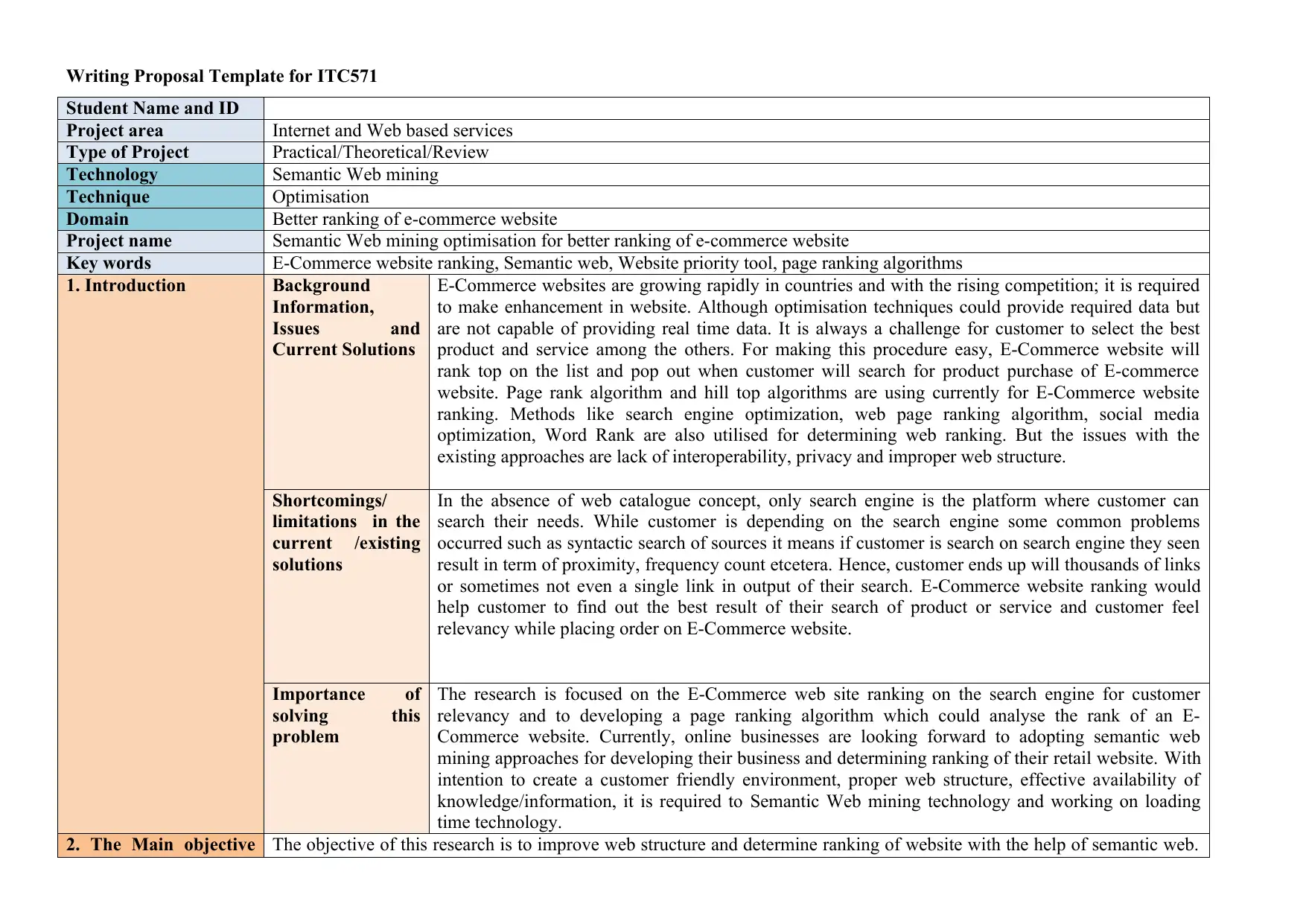
Writing Proposal Template for ITC571
Student Name and ID
Project area Internet and Web based services
Type of Project Practical/Theoretical/Review
Technology Semantic Web mining
Technique Optimisation
Domain Better ranking of e-commerce website
Project name Semantic Web mining optimisation for better ranking of e-commerce website
Key words E-Commerce website ranking, Semantic web, Website priority tool, page ranking algorithms
1. Introduction Background
Information,
Issues and
Current Solutions
E-Commerce websites are growing rapidly in countries and with the rising competition; it is required
to make enhancement in website. Although optimisation techniques could provide required data but
are not capable of providing real time data. It is always a challenge for customer to select the best
product and service among the others. For making this procedure easy, E-Commerce website will
rank top on the list and pop out when customer will search for product purchase of E-commerce
website. Page rank algorithm and hill top algorithms are using currently for E-Commerce website
ranking. Methods like search engine optimization, web page ranking algorithm, social media
optimization, Word Rank are also utilised for determining web ranking. But the issues with the
existing approaches are lack of interoperability, privacy and improper web structure.
Shortcomings/
limitations in the
current /existing
solutions
In the absence of web catalogue concept, only search engine is the platform where customer can
search their needs. While customer is depending on the search engine some common problems
occurred such as syntactic search of sources it means if customer is search on search engine they seen
result in term of proximity, frequency count etcetera. Hence, customer ends up will thousands of links
or sometimes not even a single link in output of their search. E-Commerce website ranking would
help customer to find out the best result of their search of product or service and customer feel
relevancy while placing order on E-Commerce website.
Importance of
solving this
problem
The research is focused on the E-Commerce web site ranking on the search engine for customer
relevancy and to developing a page ranking algorithm which could analyse the rank of an E-
Commerce website. Currently, online businesses are looking forward to adopting semantic web
mining approaches for developing their business and determining ranking of their retail website. With
intention to create a customer friendly environment, proper web structure, effective availability of
knowledge/information, it is required to Semantic Web mining technology and working on loading
time technology.
2. The Main objective The objective of this research is to improve web structure and determine ranking of website with the help of semantic web.
Student Name and ID
Project area Internet and Web based services
Type of Project Practical/Theoretical/Review
Technology Semantic Web mining
Technique Optimisation
Domain Better ranking of e-commerce website
Project name Semantic Web mining optimisation for better ranking of e-commerce website
Key words E-Commerce website ranking, Semantic web, Website priority tool, page ranking algorithms
1. Introduction Background
Information,
Issues and
Current Solutions
E-Commerce websites are growing rapidly in countries and with the rising competition; it is required
to make enhancement in website. Although optimisation techniques could provide required data but
are not capable of providing real time data. It is always a challenge for customer to select the best
product and service among the others. For making this procedure easy, E-Commerce website will
rank top on the list and pop out when customer will search for product purchase of E-commerce
website. Page rank algorithm and hill top algorithms are using currently for E-Commerce website
ranking. Methods like search engine optimization, web page ranking algorithm, social media
optimization, Word Rank are also utilised for determining web ranking. But the issues with the
existing approaches are lack of interoperability, privacy and improper web structure.
Shortcomings/
limitations in the
current /existing
solutions
In the absence of web catalogue concept, only search engine is the platform where customer can
search their needs. While customer is depending on the search engine some common problems
occurred such as syntactic search of sources it means if customer is search on search engine they seen
result in term of proximity, frequency count etcetera. Hence, customer ends up will thousands of links
or sometimes not even a single link in output of their search. E-Commerce website ranking would
help customer to find out the best result of their search of product or service and customer feel
relevancy while placing order on E-Commerce website.
Importance of
solving this
problem
The research is focused on the E-Commerce web site ranking on the search engine for customer
relevancy and to developing a page ranking algorithm which could analyse the rank of an E-
Commerce website. Currently, online businesses are looking forward to adopting semantic web
mining approaches for developing their business and determining ranking of their retail website. With
intention to create a customer friendly environment, proper web structure, effective availability of
knowledge/information, it is required to Semantic Web mining technology and working on loading
time technology.
2. The Main objective The objective of this research is to improve web structure and determine ranking of website with the help of semantic web.
Paraphrase This Document
Need a fresh take? Get an instant paraphrase of this document with our AI Paraphraser
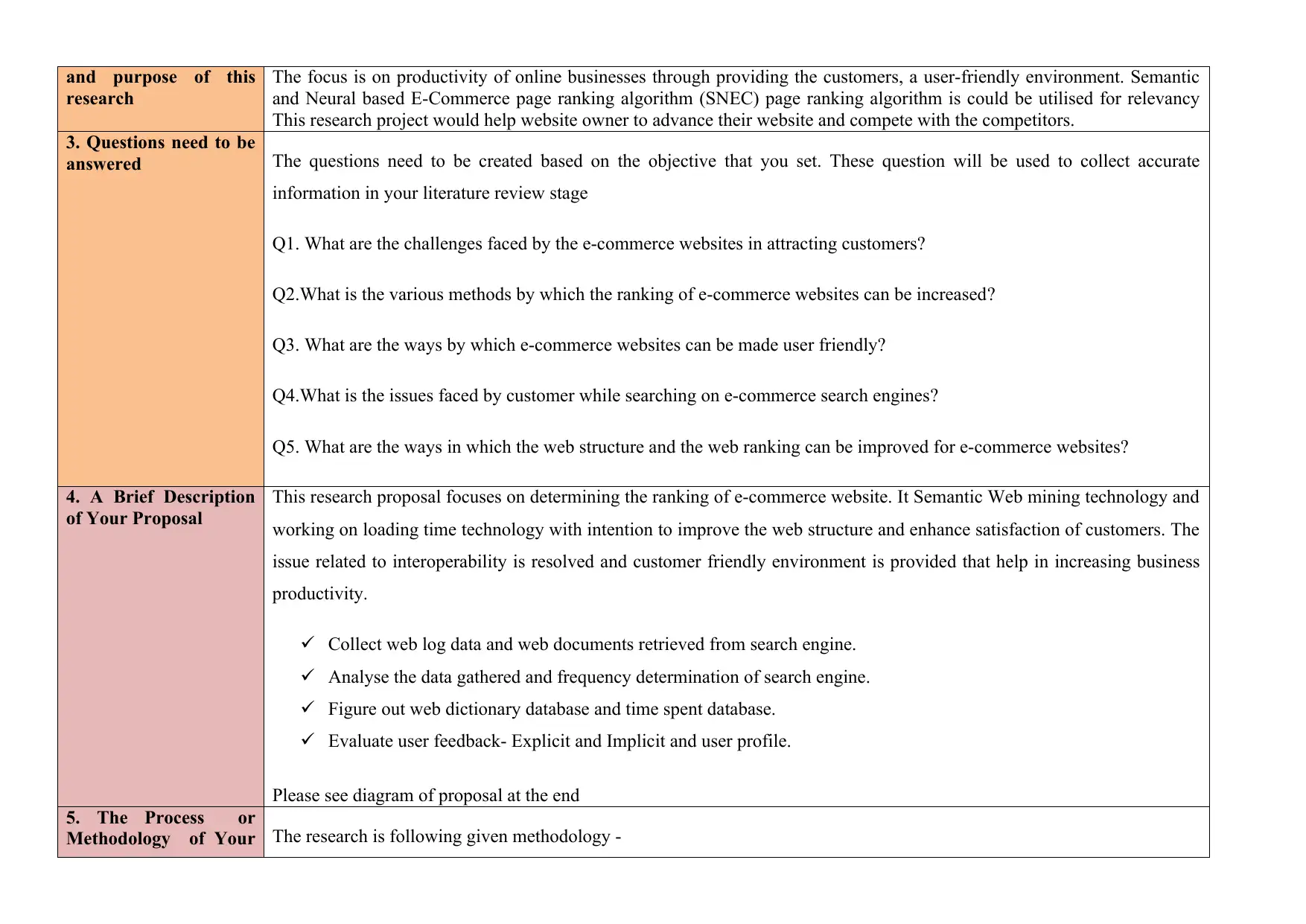
and purpose of this
research
The focus is on productivity of online businesses through providing the customers, a user-friendly environment. Semantic
and Neural based E-Commerce page ranking algorithm (SNEC) page ranking algorithm is could be utilised for relevancy
This research project would help website owner to advance their website and compete with the competitors.
3. Questions need to be
answered The questions need to be created based on the objective that you set. These question will be used to collect accurate
information in your literature review stage
Q1. What are the challenges faced by the e-commerce websites in attracting customers?
Q2.What is the various methods by which the ranking of e-commerce websites can be increased?
Q3. What are the ways by which e-commerce websites can be made user friendly?
Q4.What is the issues faced by customer while searching on e-commerce search engines?
Q5. What are the ways in which the web structure and the web ranking can be improved for e-commerce websites?
4. A Brief Description
of Your Proposal
This research proposal focuses on determining the ranking of e-commerce website. It Semantic Web mining technology and
working on loading time technology with intention to improve the web structure and enhance satisfaction of customers. The
issue related to interoperability is resolved and customer friendly environment is provided that help in increasing business
productivity.
Collect web log data and web documents retrieved from search engine.
Analyse the data gathered and frequency determination of search engine.
Figure out web dictionary database and time spent database.
Evaluate user feedback- Explicit and Implicit and user profile.
Please see diagram of proposal at the end
5. The Process or
Methodology of Your The research is following given methodology -
research
The focus is on productivity of online businesses through providing the customers, a user-friendly environment. Semantic
and Neural based E-Commerce page ranking algorithm (SNEC) page ranking algorithm is could be utilised for relevancy
This research project would help website owner to advance their website and compete with the competitors.
3. Questions need to be
answered The questions need to be created based on the objective that you set. These question will be used to collect accurate
information in your literature review stage
Q1. What are the challenges faced by the e-commerce websites in attracting customers?
Q2.What is the various methods by which the ranking of e-commerce websites can be increased?
Q3. What are the ways by which e-commerce websites can be made user friendly?
Q4.What is the issues faced by customer while searching on e-commerce search engines?
Q5. What are the ways in which the web structure and the web ranking can be improved for e-commerce websites?
4. A Brief Description
of Your Proposal
This research proposal focuses on determining the ranking of e-commerce website. It Semantic Web mining technology and
working on loading time technology with intention to improve the web structure and enhance satisfaction of customers. The
issue related to interoperability is resolved and customer friendly environment is provided that help in increasing business
productivity.
Collect web log data and web documents retrieved from search engine.
Analyse the data gathered and frequency determination of search engine.
Figure out web dictionary database and time spent database.
Evaluate user feedback- Explicit and Implicit and user profile.
Please see diagram of proposal at the end
5. The Process or
Methodology of Your The research is following given methodology -
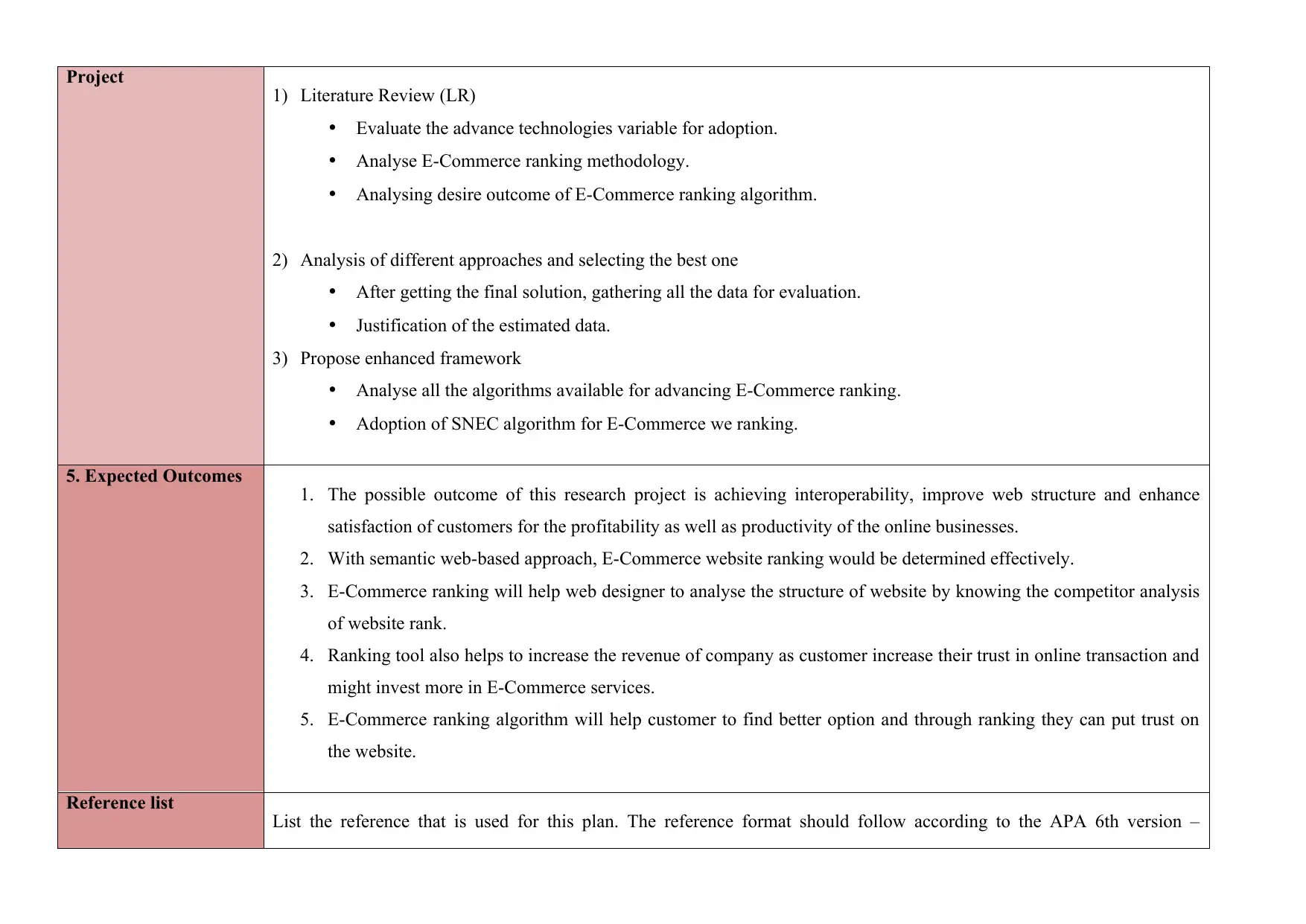
Project 1) Literature Review (LR)
Evaluate the advance technologies variable for adoption.
Analyse E-Commerce ranking methodology.
Analysing desire outcome of E-Commerce ranking algorithm.
2) Analysis of different approaches and selecting the best one
After getting the final solution, gathering all the data for evaluation.
Justification of the estimated data.
3) Propose enhanced framework
Analyse all the algorithms available for advancing E-Commerce ranking.
Adoption of SNEC algorithm for E-Commerce we ranking.
5. Expected Outcomes 1. The possible outcome of this research project is achieving interoperability, improve web structure and enhance
satisfaction of customers for the profitability as well as productivity of the online businesses.
2. With semantic web-based approach, E-Commerce website ranking would be determined effectively.
3. E-Commerce ranking will help web designer to analyse the structure of website by knowing the competitor analysis
of website rank.
4. Ranking tool also helps to increase the revenue of company as customer increase their trust in online transaction and
might invest more in E-Commerce services.
5. E-Commerce ranking algorithm will help customer to find better option and through ranking they can put trust on
the website.
Reference list
List the reference that is used for this plan. The reference format should follow according to the APA 6th version –
Evaluate the advance technologies variable for adoption.
Analyse E-Commerce ranking methodology.
Analysing desire outcome of E-Commerce ranking algorithm.
2) Analysis of different approaches and selecting the best one
After getting the final solution, gathering all the data for evaluation.
Justification of the estimated data.
3) Propose enhanced framework
Analyse all the algorithms available for advancing E-Commerce ranking.
Adoption of SNEC algorithm for E-Commerce we ranking.
5. Expected Outcomes 1. The possible outcome of this research project is achieving interoperability, improve web structure and enhance
satisfaction of customers for the profitability as well as productivity of the online businesses.
2. With semantic web-based approach, E-Commerce website ranking would be determined effectively.
3. E-Commerce ranking will help web designer to analyse the structure of website by knowing the competitor analysis
of website rank.
4. Ranking tool also helps to increase the revenue of company as customer increase their trust in online transaction and
might invest more in E-Commerce services.
5. E-Commerce ranking algorithm will help customer to find better option and through ranking they can put trust on
the website.
Reference list
List the reference that is used for this plan. The reference format should follow according to the APA 6th version –
⊘ This is a preview!⊘
Do you want full access?
Subscribe today to unlock all pages.

Trusted by 1+ million students worldwide
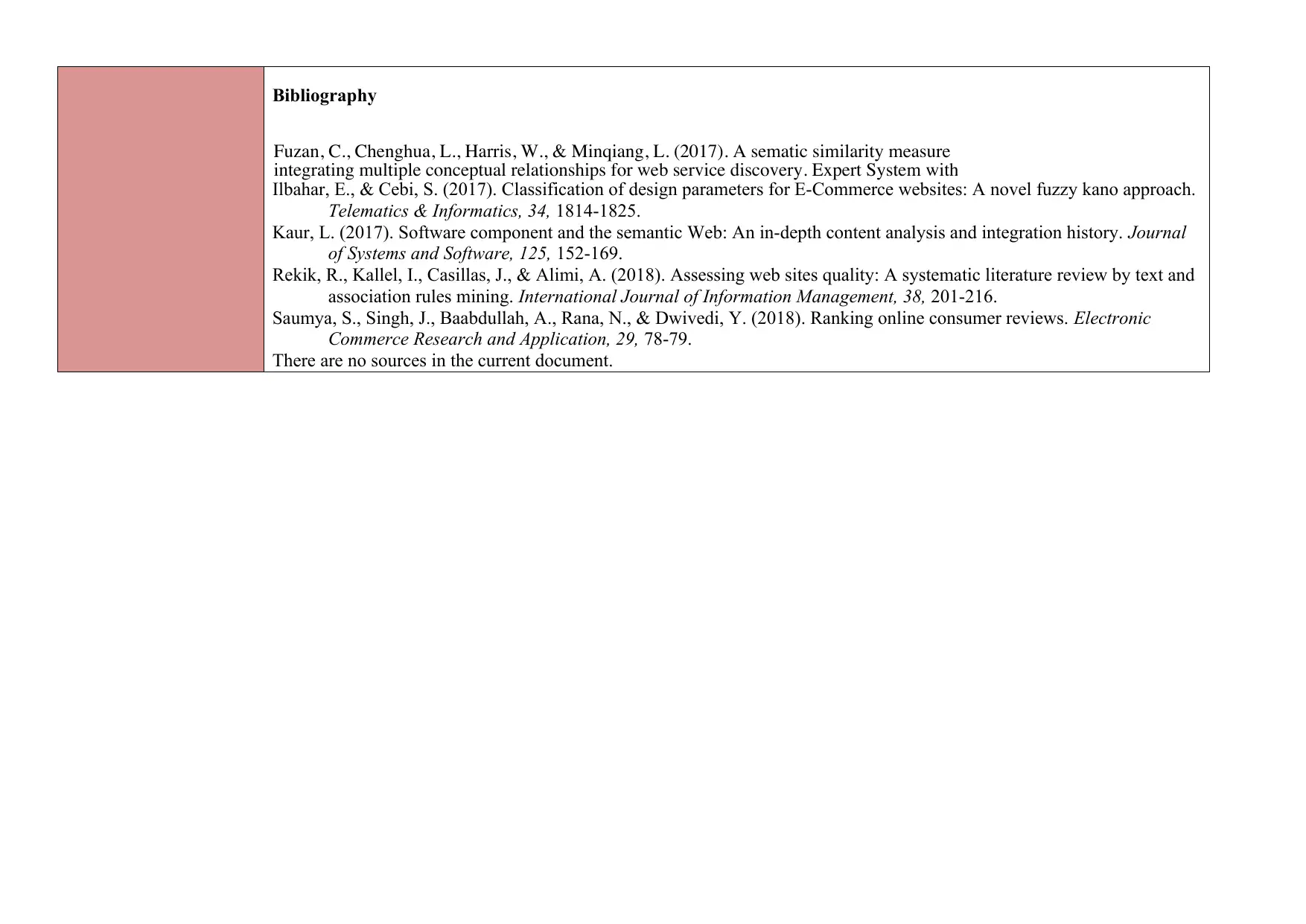
Bibliography
Ilbahar, E., & Cebi, S. (2017). Classification of design parameters for E-Commerce websites: A novel fuzzy kano approach.
Telematics & Informatics, 34, 1814-1825.
Kaur, L. (2017). Software component and the semantic Web: An in-depth content analysis and integration history. Journal
of Systems and Software, 125, 152-169.
Rekik, R., Kallel, I., Casillas, J., & Alimi, A. (2018). Assessing web sites quality: A systematic literature review by text and
association rules mining. International Journal of Information Management, 38, 201-216.
Saumya, S., Singh, J., Baabdullah, A., Rana, N., & Dwivedi, Y. (2018). Ranking online consumer reviews. Electronic
Commerce Research and Application, 29, 78-79.
There are no sources in the current document.
Ilbahar, E., & Cebi, S. (2017). Classification of design parameters for E-Commerce websites: A novel fuzzy kano approach.
Telematics & Informatics, 34, 1814-1825.
Kaur, L. (2017). Software component and the semantic Web: An in-depth content analysis and integration history. Journal
of Systems and Software, 125, 152-169.
Rekik, R., Kallel, I., Casillas, J., & Alimi, A. (2018). Assessing web sites quality: A systematic literature review by text and
association rules mining. International Journal of Information Management, 38, 201-216.
Saumya, S., Singh, J., Baabdullah, A., Rana, N., & Dwivedi, Y. (2018). Ranking online consumer reviews. Electronic
Commerce Research and Application, 29, 78-79.
There are no sources in the current document.
Paraphrase This Document
Need a fresh take? Get an instant paraphrase of this document with our AI Paraphraser
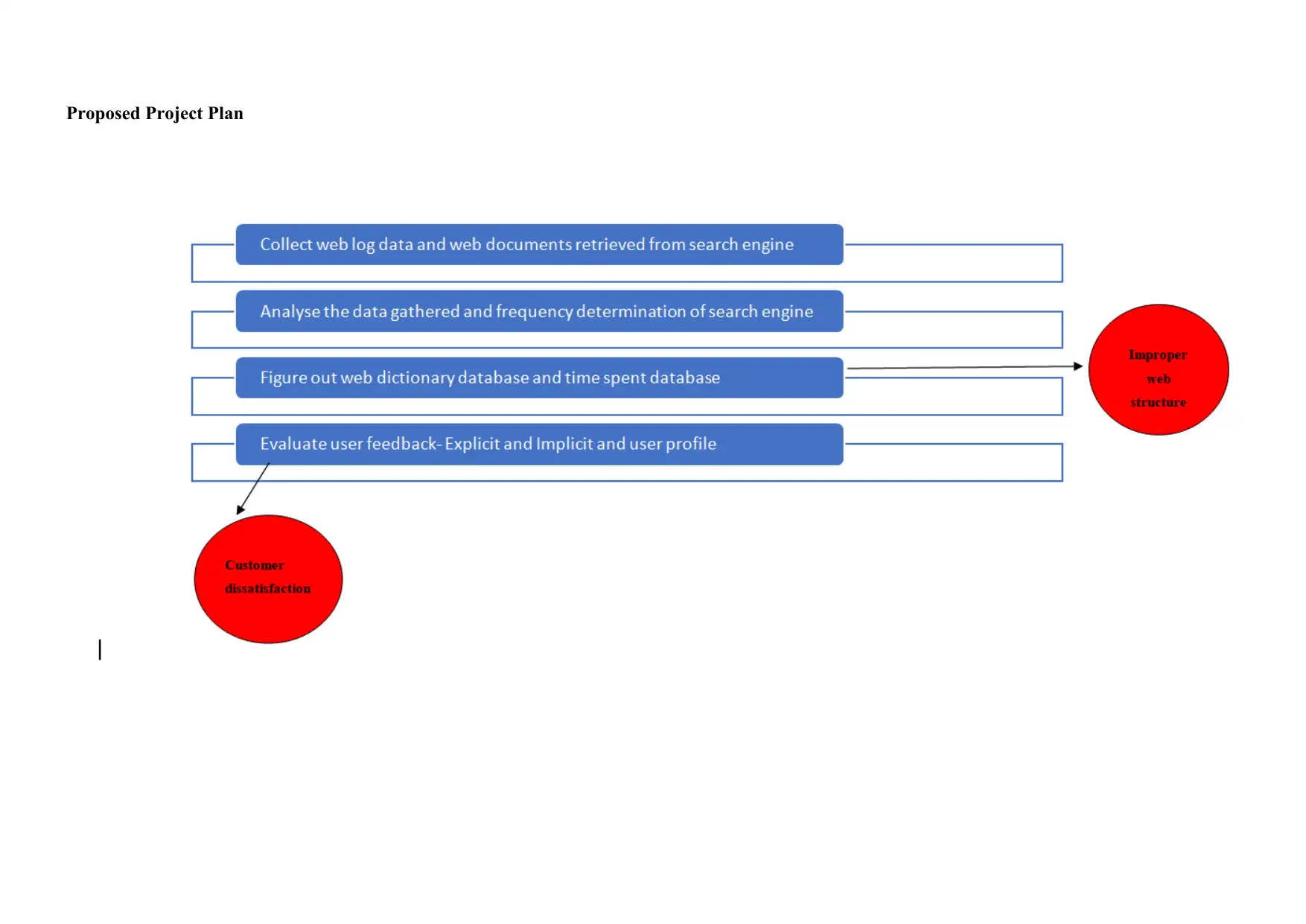
Proposed Project Plan
1 out of 5
Related Documents
Your All-in-One AI-Powered Toolkit for Academic Success.
+13062052269
info@desklib.com
Available 24*7 on WhatsApp / Email
![[object Object]](/_next/static/media/star-bottom.7253800d.svg)
Unlock your academic potential
Copyright © 2020–2026 A2Z Services. All Rights Reserved. Developed and managed by ZUCOL.





